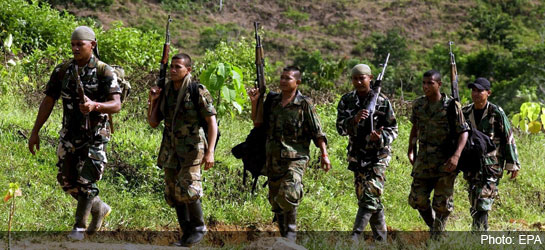
Twenty one years on from the Segovia massacre in Antioquia, survivors gathered in Medellin to remember the 43 civilians gunned down by paramilitaries. Those responsible remain unpunished.
The massacre, which occurred in the evening of November 11, 1988, was one of the first massacres committed by paramilitaries at the end of the 1980’s. Paramilitary group ‘Death to North-eastern Revolutionaries’ (MRD) entered the town of 20,000 and committed the massacre in a bid to sow terror and demonstrate its power in the region, Verdad Abierta reported.
Days before the massacre the town had been flooded with MRD pamphlets threatening the lives of local social and political leaders. Such a practice is still carried out by paramilitary groups around Colombia.
Survivor Luz Marina Restrepo Cardenas lost her father and two brothers in the massacre. She told Verdad Abierta that she remembers “rivers of blood running through the streets” when it began to rain post massacre.
Restrepo attended the Mass held at the Museum of Antioquia last Wednesday to commemorate those murdered in the massacre. The Mass Memorial was one of several activities organized by the Historical Memory Group of the National Commission for Reparation and Reconciliation (CNRR).
Verdad Abierta states that little has been done to bring those responsible to justice. Impunity is aggravated by the fact that human rights organizations in the region believe that it is almost impossible to gather evidence so long after the fact. Moreover paramilitary groups remain active in the area.
Investigator for the Historical Memory Group of the CNRR Andres Suarez recognizes the immense task it will take to bring the culprits to justice.
However “we consider it is important to return to the past and recover this theme because memory is directly linked with democratization and where there has been this type of extermination, we can not aspire to a democratic future if past events are not recognized and resolved,” Suarez said.
To bring justice is the role of the CNRR.
The Segovia massacre falls outside the authority of the International Criminal Court (ICC) –recently given new jurisdiction in Colombia – as it can only try genocide and crimes against humanity cases that have occurred after 2002 and war crimes that have taken place after 2009.

